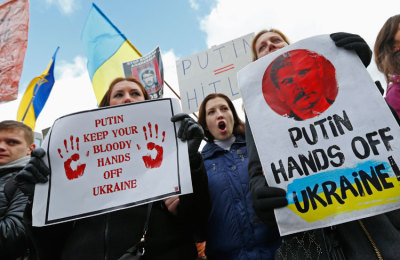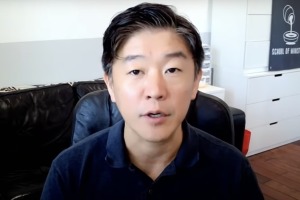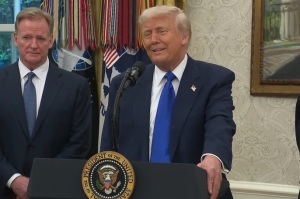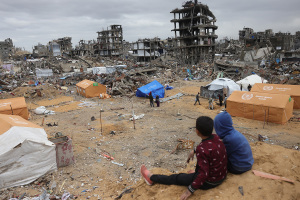The Ukraine: A litmus test for Western civilization

Once again, the specter of armed conflict and military aggression is casting its deadly and ominous shadow over Europe. Vladimir Putin, the Russian oligarch and old KGB colonel who has said that the “greatest geopolitical tragedy of the century” was the collapse of the “evil empire” of the old Soviet Union, is threatening to invade the sovereign country of Ukraine.
Everyone needs to understand that Putin cannot fulfill his life’s ambition to rebuild the old Soviet Union under the banner of Russia without putting Ukraine once again under Russian control and rule.
For example, the old Soviet Union had a population of just over 293 million people when it ceased to exist as a political entity in 1991. Today, Russia has a population of 146 million people. Ukraine has a population of 41.5 million people. If you combine the two countries’ populations, you have 187 million people or approximately 65% of the population of the former Soviet Union.
Putin has already forcibly put Crimea and parts of eastern Ukraine back under Russian control and now he is casting a covetous eye on the rest of Ukraine and all its tremendous natural resources.
Why would Putin’s Russia threaten to invade Ukraine now and amass troops along the border? Quite simply, the profound weakness and odd obtuseness of the Biden administration is more temptation than the Putins of the world can withstand. When the bad actors in the world are confronted with the opportunity to further long-held territorial ambitions and their national “interests” and the only thing standing in their way is the bluster and empty talk of the Biden foreign policy team, they are almost certain to act.
The Russians, the Chinese, the North Koreans, and the Iranians, among other bad actors, are taking notes and preparing aggressions of their own. The greatest danger to world peace for the vast majority of the world’s population is American weakness or lack of resolve to resist aggression by the bad actors and bullies of the world.
As Putin amassed troops on the Ukraine border, President Biden ruled out the use of military force and said that NATO troops on the ground in Ukraine “is not on the table.” Instead, Biden told Putin that Russia would face “economic consequences like none he’s ever seen” if he invaded Ukraine.
I am not advocating that American military personnel be involved in combat with Russians in Ukraine, but how foolish (and may I say, “stupid!”) to announce that in advance and remove any hesitancy on Putin’s part.
The situation is complicated by the fact that in 2008, NATO entered into an arrangement with Ukraine as a “partner,” but not a member of NATO (Ukraine has sent soldiers to fight on several NATO missions such as Iraq and Afghanistan.)
Mr. Putin views Ukraine as “an inalienable part of Russia,” an opinion not shared by a majority of Ukrainians themselves. NATO (The North Atlantic Treaty Organization) was founded in 1949 to resist Soviet aggression in Europe or, as was infamously explained by a British general, “to keep the Russians out, the Americans in, and the Germans down!”).
If Mr. Putin launches a military invasion into Ukraine and the West allows him to do so successfully, the world instantaneously becomes a more dangerous and volatile place.
As I wrote in March 2014, “Since the end of World War II, America has been the reluctant, but necessary, chief of police, making sure there are cops on the beat who prevent bigger countries and their regimes from brutalizing and conquering weaker countries. This policy successfully kept a significant portion of the world free from Soviet and Communist domination until the Soviet Union’s demise in 1991.”
When the U.S. has appeared weak and indecisive, the world’s bad actors have been emboldened (the Iran hostage crisis and the Soviet invasion of Afghanistan in 1980 providing prime illustrations of this truth) under the criminally weak foreign policy of President Carter. I am told by reliable, but confidential military sources, that at the time of the Russian invasion of Afghanistan, President Carter had allowed our military to deteriorate to the point that only two of the U.S. Army’s combat divisions were considered well-provisioned enough to go into battle.
Another important factor to consider in the Ukrainian situation is the nuclear equation. In 1991, when the Soviet Union ceased to exist, the newly independent Ukraine (inheriting part of Moscow’s nuclear arsenal) was for one brief moment the world’s third-leading nuclear power. Ukraine had control of over 1,800 nuclear weapons, more than any nation except the U.S. and Russia.
The Clinton administration, rightly concerned about nuclear proliferation and about these weapons falling into the hands of terrorists, made it a high priority to urge Ukraine to give up its nuclear weapons for economic and security guarantees. Ukraine did so in return for the “Budapest Memorandum on Security Assurances” in which Ukraine gave up its nukes and signed the Nuclear Non-Proliferation Treaty and Russia, Britain and the U.S. pledged to protect Ukraine’s “territorial integrity.”
This pledge has proven to be the emptiest of promises as the Russian aggression in Crimea and its threat to seize further Ukrainian territory illustrates vividly. Does anyone really think that if Ukraine still possessed even a small portion of its former nuclear arsenal that Crimea would now be “annexed” by Russia? And the new threats of invasion would not be happening if Ukraine were even a minor nuclear power.
The annexation of Crimea in 2014 was a violation of both the “Budapest Memorandum” and the bilateral 1997 “Treaty of Friendship, Cooperation and Partnership” between Ukraine and the Russian Federation. And in important respects, Ukraine is the “canary in the coal mine.”
As NATO has neglected its military deterrent, Russia has attempted to fill the void and exploit the strategic opportunity.
What should America and her fellow Western European allies (Britain, France, Germany, Belgium, Holland, etc.) do? They should commence immediately to arm the frontline states from the Baltic to the Black Sea to make it very painful and costly for the Russians to use military force.
We should not send American or Western European troops, but sophisticated weaponry (stinger missiles, the most advanced anti-tank and anti-aircraft weapons) beginning first with the Ukrainians and then the other frontline states.
We should do our best to make Ukraine the military equivalent of an angry porcupine, making the cost in Russian lives too expensive for Putin to justify it to his people.
After all, the Ukrainians are not asking us to spill our blood for their freedom. They are asking us to give them the weapons to defend themselves against Russian aggression.
Bernard Lewis, the late Middle East scholar, once observed that “while it is dangerous to be America’s enemy, it can be fatal to be its friend.” (“Their Friends the Americans,” The Wall Street Journal, Dec. 9, 2021.)
We owe a debt of honor to the Ukrainians. We as a nation promised them that if they gave up their nuclear weapons, we and our allies would protect them from Russian invasion. Will we fulfill our promise, give them weapons to make invasion a heavier price than the Russians are willing to pay, or will we go back on our word?
If we do, our word will become meaningless, our allies will not trust us, and as many of them as possible will seek to obtain nuclear weapons themselves, making the world a vastly more dangerous place. The more nations that possess nuclear weapons, the more likely they are to be used.
A great deal is at stake in the decisions being made in the next six weeks or so. I wish I had more confidence that President Biden and his security team had more understanding of just how immense their responsibilities are. Frankly, I don’t have any confidence they have a clue.
As instructed by Scripture, I pray for all who are in authority every day, and that includes President Biden and the members of his administration. May God give them wisdom, courage and insight.
Dr. Richard Land, BA (Princeton, magna cum laude); D.Phil. (Oxford); Th.M (New Orleans Seminary). Dr. Land served as President of Southern Evangelical Seminary from July 2013 until July 2021. Upon his retirement, he was honored as President Emeritus and he continues to serve as an Adjunct Professor of Theology & Ethics. Dr. Land previously served as President of the Southern Baptist Convention's Ethics & Religious Liberty Commission (1988-2013) where he was also honored as President Emeritus upon his retirement. Dr. Land has also served as an Executive Editor and columnist for The Christian Post since 2011.
Dr. Land explores many timely and critical topics in his daily radio feature, “Bringing Every Thought Captive,” and in his weekly column for CP.





























